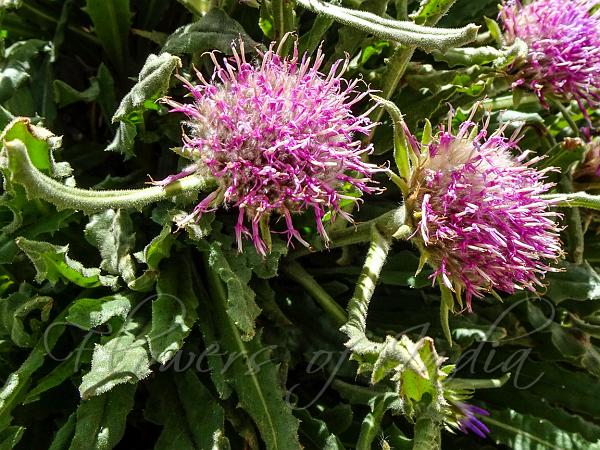|
| Glandular Saw-Wort |
|

|

|
|
|
|
Photo: |
Botanical name: Saussurea schlagintweitii Family: Asteraceae (Sunflower family)
Synonyms: Saussurea glanduligera, Theodorea glanduligera
Synonyms: Saussurea glanduligera, Theodorea glanduligera
Glandular Saw-Wort is a perennial herb 10-20 cm tall,
sometimes clustered. It is named for Adolf von Schlagintweit
(1829-1857), a German botanist and explorer of Central Asia.
Flower-heads are large, borne singly at branch-ends on stem, usually
surrounded by uppermost linear leaves. Florets are purplish red,
1.5-1.7 cm, tube 7-8 mm, limb 8-9 mm, lobes 4-5 mm. Involucres are
broadly bell-shaped, 2.5-3.5 cm in diameter. Phyllaries are in 3 or 4
rows, narrowly triangular-ovate to subulate, densely hairy, tip
tapering; outer phyllaries green, 12-20 x 2-3 mm; middle and inner
phyllaries purple, 1.8-2 x 0.1-0.2 cm. Caudex is branched, with several
sterile leaf rosettes and flowering stems. Stem solitary, erect,
simple, covered at base with remains of leaf-stalks. Rosette and basal
stem leaves are stalked; leaf-stalk above densely white woolly or silky
at base. Leaves are narrowly elliptic to linear, 2-10 x 0.7-1.2 cm,
both surfaces green and densely glandular hairy, margin wavy-toothed.
Middle and upper stem leaves are similar to lower ones. Seed-pods are
cylindric or obconic, 4-5 mm, 4-angled, at tip with glands. Glandular
Saw-Wort is found on scree slopes, grasslands, rock crevices, at
altitudes of 4700-5500 m, in SW Xinjiang to Western Himalaya.
Flowering: July-September.
| Identification credit: Jennifer Chandler | Photographed in Ladakh. |
• Is this flower misidentified? If yes,